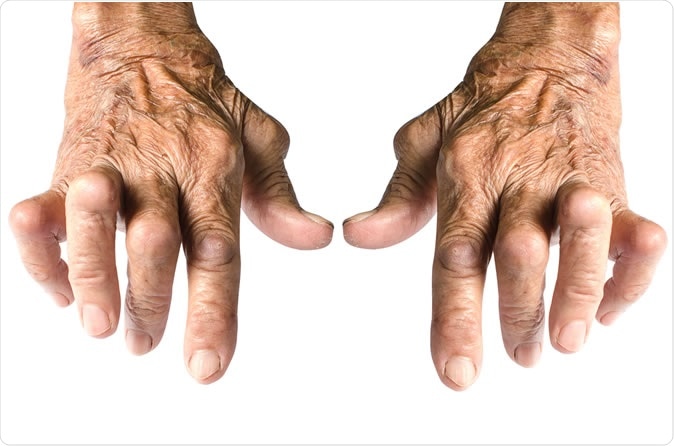
Study compared efficacy and safety of biological disease-modifying antirheumatic drugs (bDMARDs) between elderly-onset rheumatoid arthritis (EORA) and young-onset rheumatoid arthritis (YORA) patients. - Image Credit: Chaowalit Seeneha / Shutterstock
It is a chronic, progressive and debilitating condition, accompanied by significant pain and disability. It causes joint pain, swelling and stiffness, restricting the movement of the joint, most frequently the small joints of the hands and feet. Occasionally, it attacks other organs such as the eyes, the skin and the lungs.
Biologics are natural or similar to natural molecules with activity on one or more sites of the immune system. By modulating immune activity, it is hoped that the disease will go into remission, or an inactive state, preventing further joint inflammation and subsequent damage. Thus this treatment is part of a spectrum of disease-modifying anti-rheumatic drugs (DMARDs) which seek to alter the course of the disease rather than only limit the symptoms.
In many cases, older patients presenting with RA have more severe and active disease, with greater disability, compared to those who present younger. However, these patients are less likely to receive treatment with biologics compared to those in whom RA presents earlier in life. In the registry used for the current study, about 18% of elderly-onset RA patients were put on biologics compared to 28% of young-onset RA patients. In other words, significant undertreatment of RA is occurring in the elderly, according to researcher Sadao Jinno.
The study
The current study was motivated by the recognition of a wide gap in biologic drug use between younger and older patients with RA. Says Jinno, “In our daily practice, we have seen many elderly-onset RA patients treated with biologics effectively and safely. We wanted to investigate if there are differences in efficacy and safety of biologics between the two age groups.”
The researchers studied almost 7200 patients with RA aged 18 or older, treated at multiple centers, between September 2009 and December 2017. The criterion for inclusion was a Disease Activity Score-28 (DAS-28) of 3.2 or more, and an ESR measurement before starting biologics. The DAS-28 assesses joint disease in 28 joints.
The study was based on finding how the age at onset of RA affected the clinical effectiveness of biologics at 48 weeks post-initiation. To assess this, they used a score called the Clinical Disease Activity Index (CDAI). They also measured three other secondary outcomes: biologic retention at 48 weeks, remission with low disease activity, as assessed by the CDAI, and remission.
The 989 patients were classified by age into two groups: elderly-onset RA and young-onset RA, numbering 364 and 625 patients, respectively. In percentage terms this comes to 37% and 63%. They evaluated the two groups based on the mean CDAI and then adjusted the scores for different baseline characteristics.
The findings
The two groups showed comparable rates of improvement at 48 weeks, which indicates that biologics are just as effective in both older and young patients. CDAI scores as well as the proportion of patients who achieved low disease activity or remission were equal in both groups. However, remission rates were lower in the first group, though this was not statistically significant. The rate of drug continuation and of discontinuation due to adverse effects showed no significant difference between both groups.
However, the use of biologics always entails a higher risk of certain side effects, especially infections, and this means that doctors must use good judgment to select the elderly patients in whom this therapy would be safest and most effective.
The researchers plan next to use different modes of biologics in elderly patients to see if this makes any difference in the CDAI.
Journal reference:
Jinno S, Onishi A, Akashi K, Hashimoto M, Yamamoto W, Murata K, Takeuchi T, Kotani T, Maeda Y, Ebina K, Son Y, Amuro H, Hara R, Katayama M, Saegusa J, Morinobu A. Are There Differences in Efficacy and Safety of Biological Disease-modifying Antirheumatic Drugs Between Elderly-onset and Young-onset Rheumatoid Arthritis? [abstract]. Arthritis Rheumatol. 2019; 71 (suppl 10). https://acrabstracts.org/abstract/are-there-differences-in-efficacy-and-safety-of-biological-disease-modifying-antirheumatic-drugs-between-elderly-onset-and-young-onset-rheumatoid-arthritis/. Accessed November 11, 2019.